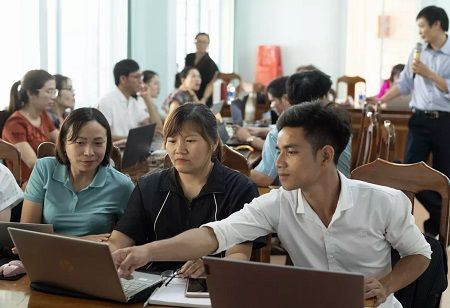-
UNICEF is dedicated to unlocking the potential of AI technology to transform education, aiming to enhance teaching methods and create more engaging learning environments. Recently, UNICEF hosted a two-day intensive workshop in Vietnam's Kon Tum province, bringing together over 40 teachers from five remote districts. The workshop was designed to equip educators with the skills to integrate AI tools into their classrooms and revolutionize the way they prepare and deliver lessons.
For teachers like Dao Duy Khanh, the impact has been immediate. Khanh now regularly uses AI applications to refine his lesson plans, adding images and videos to make his informatics classes more dynamic and engaging. “My students will love the lessons as they are now more vivid and interactive than before”, he shared.
This initiative is part of UNICEF’s broader mission to support teachers in marginalized areas, ensuring that AI tools can bridge the gap between remote schools and urban centers, promoting equitable learning opportunities for all students.For Khanh, the impacts were immediate. Khanh now can research supplemental information on the topics he plans to teach, and craft a vibrant lesson plan enriched with images and videos.
“My pupils will love the lesson as it is now more vivid and engaging than before,” he said. He also highlighted the efficiency of the AI applications, sharing “The AI applications save the time and energy I used to spend on preparing a lesson. I had heard about them but only learned how to use them after this training course”.
Tara O’Connell, Chief of Education for UNICEF Viet Nam, observes, “Initial reactions of teachers and school administrators to AI use in classrooms is often negative and focused on the ability of students to rely on AI rather than doing their own work. While this is a real risk, there are massive benefits to using AI and once teachers see the various ways AI can strengthen their preparation and their teaching methods to revolutionize the learning experience of children, they become strong supporters”.
“With the generous support of the Korean Committee for UNICEF, these AI training courses and the Promoting Digital Literacy, Well-being and Transferable Skills for Marginalized Students project more broadly will deliver sustainable impacts in the classroom to help address the digital divide and ensure equitable learning environments and outcomes for all students”. - UNICEF Representative in Viet Nam, Silvia Danailov.
The Promoting Digital Literacy, Well-being and Transferable Skills for Marginalized Students project targets the provinces of Lao Cai and Gia Lai, and extends to other UNICEF focus provinces including Dien Bien, Kon Tum, Soc Trang, Gia Lai, Lao Cai, Ninh Thuan, and An Giang between 2024 and 2026. The Kon Tum education sector has been a pioneer in applying AI, aiming to create a lasting and profound impact in schools. “Through AI applications, I can get various solutions for the same problem”, he added. “It’s crucial for me to figure out and select the most appropriate answers for my lessons”.
Later, Khanh plans to share his newly acquired AI knowledge with his colleagues at Te Xang Primary and Secondary Boarding School for Ethnic Minority Groups, situated in Tu Mo Rong District, a remote area of Kon Tum. The majority of his students belong to the Xo Dang ethnic group, with parents engaged in low-income farming. By the commencement of the new academic year in early September, the school’s teachers will apply AI knowledge in crafting their lessons.
“I hope all teachers in my school will be more confident like me when using AI applications”, he expressed.
Teacher Trinh Van Dung, an IT specialist from Kon Tum Province’s Education and Training Department and the lead trainer at the course, highly praised UNICEF's support in this field.
“This is the first time the local teachers have been able to access AI applications. They have received guidance on how to use them as well as ethical considerations of using AI tools in education. Most are new and freely accessible”, he said.
Despite the progress, Dung acknowledges that teachers might require some time to become confident in using AI applications. “We should conduct training classes regularly and make them accessible to all staff in the sector”, he said.
Dung emphasized his goal of encouraging trainees to independently explore AI knowledge, given the rapid pace of technological advancements.“I hope UNICEF will continue to assist us in the field of information technology,” Dung stressed. “We hope to get an approach to training programmes of more advanced countries and get e-learning accounts subsidised for teachers in remote areas”.
Dung also noted that IT facilities in local schools have been steadily improving. “Thousands of tablets have been distributed to schools in the province, though internet connection speed remains rather limited”, he said. “Students’ profiles and teachers’ lesson plans have been digitalised on a common system. We have been among the pioneers in the field and will try to apply AI applications as broadly as possible. This is to create long-lasting effects across the whole sector to reduce the digital gap between our province and the rest of the country”.
🍪 Do you like Cookies?
We use cookies to ensure you get the best experience on our website. Read more...

